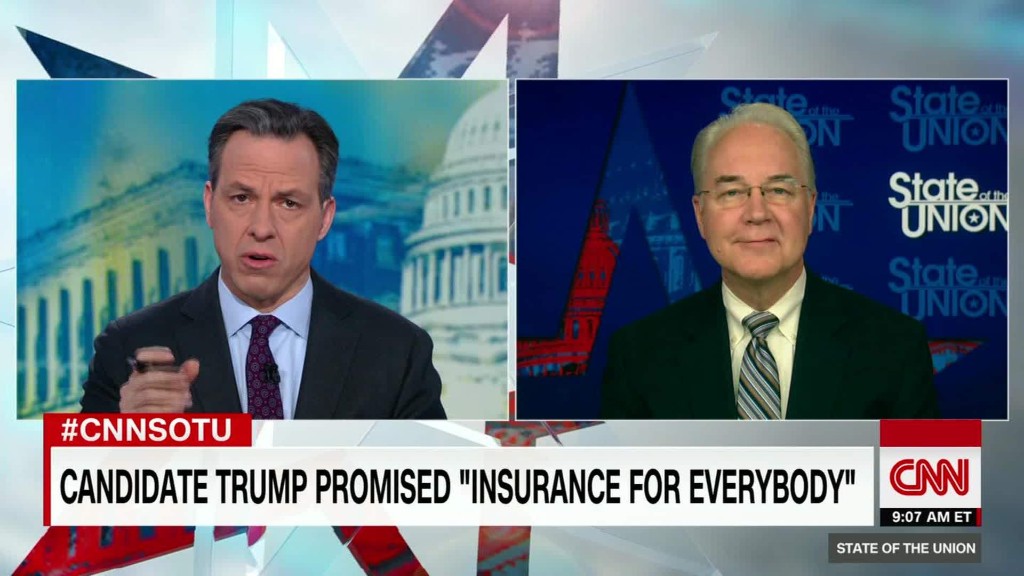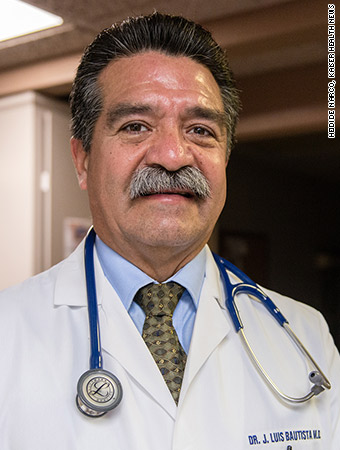
In 2012, when Jerry Goodwin showed up at a California clinic with intense pain and swelling in his legs, doctors called for an ambulance even though the hospital was across the street. That generated a $900 bill — just the beginning of a nearly three-year ordeal for Goodwin, who was uninsured.
Diagnosed with cellulitis and an irregular heartbeat, Goodwin managed to get his emergency care costs covered through the hospital but then faced month after month of bills for follow-up care and medications.
Finally, in 2015, he was able to sign up for Medicaid coverage, which was expanded under the Affordable Care Act to cover many single adults without children. "That was a big relief," said Goodwin, 64, who lives in Fresno.
Now Goodwin and people like him are worried all over again.
Under Republican efforts to repeal and replace the health law, many people on Medicaid — the nation's single-largest insurer, with 72 million beneficiaries — could see their coverage slashed.
More than 13 million recipients live in California, many in the Central Valley, the state's agricultural heartland. Toward the south, in Fresno County, about half the population of almost 985,000 relies on Medi-Cal, as California's Medicaid program is known. In adjacent Tulare County, 55% of the more than 466,000 residents were enrolled in Medi-Cal as of January 2016.
Much has been said about the plight of conservative voters in the Midwest who rely on Medicaid, a program the Trump administration and congressional Republicans are determined to shrink. But despite its reputation as a deep-blue state, California also has several red — or reddish — counties in its interior with millions of low-income people who depend heavily on Medicaid. Many live in congressional districts represented by Republicans who want to scrap or change the Affordable Care Act, also known as Obamacare.
The current Republican bill, the American Health Care Act, would cut Medicaid funding by 25% by 2026, covering 24 million fewer people than today, according to the Congressional Budget Office. A floor vote in the House of Representatives is expected on Thursday. The bill faces opposition from the left and right and likely won't survive intact.
Related: Popular coverage for children under 26 may be health law's Achilles heel
"The level of [proposed] cuts are devastating, and for California and the Central Valley, this represents a huge loss," said John Capitman, executive director at the Central Valley Health Policy Institute.
But Devin Nunes, whose congressional district includes portions of Tulare and Fresno counties, likes the proposal, saying it will improve care for everyone, including current Medi-Cal participants.
"Medi-Cal is a broken healthcare system that's been completely mismanaged by the State of California," Nunes said in a recent statement.
Medi-Cal is vital in the Central Valley because of its high poverty rate, uneven access to care and pockets with very poor health outcomes, Capitman said.
The valley suffers high rates of diabetes, obesity and heart disease. The area has some of the country's dirtiest air, triggering epidemic levels of asthma. Wage stagnation and high unemployment contribute to stress and poor mental health.
Related: GOP's Medicaid plan penalizes some states, rewards others
Some areas are far better off than others. Within 10 miles, Capitman said, you can find up to a 20-year difference in life expectancy. On average, life is much shorter for residents in Southwest Fresno, for instance, where heavy industry soils the air, homeless people camp on sidewalks, and fences cage in lots overgrown with grass and weeds.

Not far away, Dr. J. Luis Bautista, an internist at a downtown clinic, estimates he's seen a 20% increase in patient visits since Obamacare's rollout in 2014. The majority of his patients are on Medi-Cal.
"These are the people who usually wait until they're very sick to come," Bautista said. "We've seen people with high blood pressure who come in when they already have eye problems and heart problems."
But since the ACA rolled out, he said, preventive visits seem to have increased.
Petra Martinez, a former fieldworker, was waiting at the clinic to see a doctor. At 86, she receives coverage from both Medi-Cal and Medicare, the federal insurance program for seniors. She needs medication for arthritis, epilepsy and diabetes.
Though the proposed House bill seemingly would not reduce spending on people with such dual coverage, she is wary. "I'd like to think that we [seniors] will be OK... but who knows?" Martinez said. "I don't want to have to ask my children for money to go to the doctor."
Fifteen miles outside Fresno is the largely Latino town of Sanger, where almost a quarter of some 25,000 residents live in poverty, according to the U.S. Census.
Related: Families to pay price if maternity coverage gets cut in GOP's health care plan
On a recent day, a hairstylist tending to a client in a downtown salon explained that she and her two teenagers are on Medi-Cal — and so are most of the people she knows. A single mother, she said she works six days a week but can't afford to buy health coverage. Her boss chimed in that she doesn't object to greater restrictions on who gets Medi-Cal -- but coverage on the state's insurance exchange would have to be more affordable.
Both women asked not to be named for privacy reasons.
About 40 miles southeast, in Tulare, a homemaker spends her days caring for her ailing husband. The thought of Medi-Cal cutbacks fills Iliana Troncoza with anxiety. Both she and her daughter, a college freshman, rely on the program.
She went without it for six years before qualifying under the ACA expansion. At one point, she went to Mexico to have a breast cyst removed because she couldn't afford the procedure in the U.S. Now, she said, she can receive mammograms and ultrasounds at a clinic in her city.
"It's horrible to think that our Medi-Cal depends on people who don't understand our situation," Troncoza said.
This story was produced by Kaiser Health News, which publishes California Healthline, an editorially independent service of the California Health Care Foundation.


